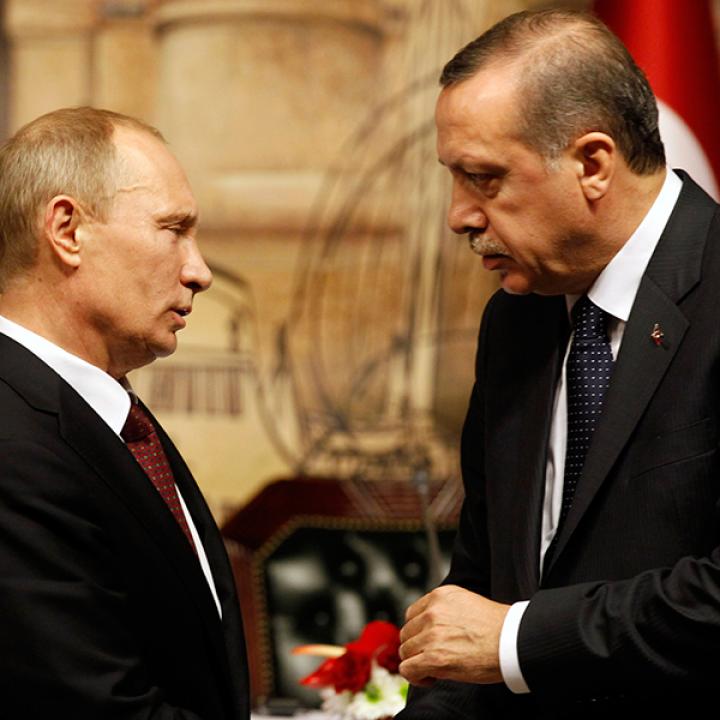
- Policy Analysis
- Articles & Op-Eds
Russia Will Want to Make Turkey Pay

For now, Moscow's retaliation will most likely come against Turkish commercial exports or gas imports, but continued Russian operations near the border mean that a dangerous military escalation is still possible.
The shooting down of a Russian jet that Turkey says violated its airspace near the Syrian border has further ratcheted up tensions between the two countries. The move appears to reflect a determination in Ankara to adopt a more aggressive posture toward Moscow. But while it is certainly a bold shift, it is very much a symptom of the problematic nature of Turkish-Russian ties.
Simply put, the two countries have diametrically opposed positions in Syria: Russia backs Bashar al-Assad's regime, which Turkey is trying to oust. Indeed, Ankara and Moscow are now effectively in a proxy war, with the former supporting the rebels while the latter is offering military support for the Assad regime.
The tensions between the two sides increased with Russia's recent deployment of forces in Syria, a move that for now at least has dashed the Turkish dream of ousting the Assad regime. The Turkish willingness to shoot down a Russian plane may reflect growing frustration with Russian bombing. Despite Moscow's claim to be aimed primarily at ISIS, the bombing appears to have been focused on northwestern Syria, which is mostly controlled by Turkey-backed rebels.
Regardless of the reasoning, the incident has brought the two countries close to outright conflict for the first time since World War I. And while it should be hoped that Turkey and Russia do not engage in direct warfare, Moscow will undoubtedly want to make Turkey pay for what it sees as a "stab in the back."
Even before Tuesday's downing, Russian President Vladimir Putin had been trying to position himself as a world leader and Russia as a global military power, so there seems no chance that he will let Ankara undermine his ambitions. With that in mind, Russia can be expected to follow a two-pronged strategy to "punish" Ankara and in doing so send a message to other states about the danger of crossing Russia.
Already, Russia has deployed anti-aircraft missiles to Syria. But a more likely focus for Moscow than outright military action against Turkey will be hitting it commercially.
Russia is one of Turkey's top trading partners, and Turkish businesses stand to lose out if Putin engages in commercial retaliation. In the past, Putin has used trade to "punish" states that oppose his hegemony, including cutting gas supplies to Ukraine and banning the export of Georgian wines and mineral water after the conflict there (Moscow's excuse for the ban was "consumer protection," but the decision was widely seen as a political tool for pressuring its neighbor).
Now, Putin can be expected to do the same with Ankara, as Turkey exports large amounts of foodstuffs to Russia. In fact, Russia has already banned the import of Turkish poultry, and it is likely that Moscow will widen import bans in the coming days unless Turkey backs down and apologizes in the dispute.
Of course, Russia could also choose to cut Turkey's access to Russian gas; Turkey depends on Russia for about half of its gas supplies. But the flip side is that Russia needs the money and has no real alternative market to a big consumer such as Turkey.
Instead, Putin's second tool against Turkish President Recep Tayyip Erdogan is his country's Syria policy. Since 2011, Turkey's approach to its neighbor has focused on ousting the Assad regime. But with this policy clearly failing, Erdogan appears to be angling to secure Ankara a seat at the table when negotiations are held for Syria's future.
This, of course, can realistically happen only if Turkey continues to have the leverage of Ankara-backed rebels holding on to the parts of Syria that they currently control. With this in mind, Russia can be expected to step up its strikes against these areas in an effort to drive Turkey-backed rebels out of Syria.
If Turkey's shooting down of the Russian plane was aimed at protecting Turkmens and boosting Turkey-backed groups, it may prove to have the opposite effect: Russia will probably increase the bombing in these areas, more civilians will suffer, and new waves of refugees could be generated.
For now, Russian retaliation seems most likely to come against Turkish trade; a temporary halting of gas exports, as was used against Ukraine, is certainly in the cards if Ankara does not stand down. But with anti-aircraft missiles in place near the Turkish-Syrian border, it is impossible to rule out a dangerous escalation -- and yet another blow to hopes that the Syria crisis can be resolved anytime soon.
Soner Cagaptay is the Beyer Family Fellow and director of the Turkish Research Program at The Washington Institute.
CNN


